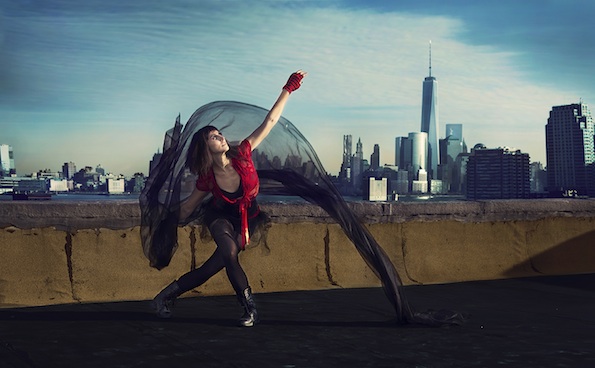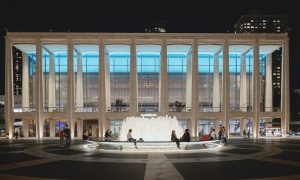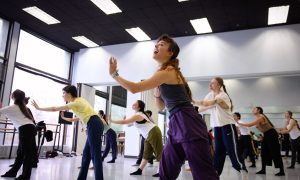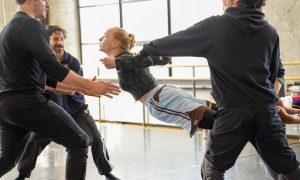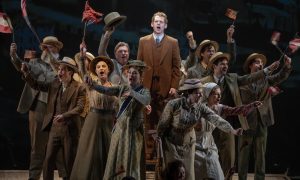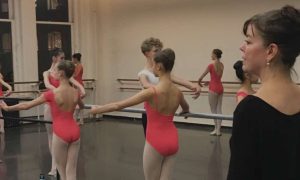By Laura Di Orio of Dance Informa.
New York City companies DoubleTake Dance and Roschman Dance share more than just the stage at their upcoming performance ARRIVAL, which runs June 6-8 at Theatre 80. They also share ideals on how they believe a company should be run in the most professional way. It may stem from the fact that these companies’ directors are still active dancers in the community, but their first concern above all else is the well-being and treatment of dancers. Although their aesthetics may differ, DoubleTake and Roschman Dance are on the same path: to raise the bar for the dance industry.
Both DoubleTake and Roschman Dance are small dance companies. DoubleTake, run by Co-Artistic Directors Ashley Carter and Vanessa Martinez de Baños, tends to have six to 10 dancers any given season. Artistic Director Sean Roschman’s Roschman Dance currently has seven dancers. As is a small company’s nature, Carter, Martinez de Baños and Roschman end up taking on most of the company’s responsibilities themselves. Scheduling, administrative duties, marketing tasks, social media maintenance and other company requirements are not doled out to others.
And, like for many small companies, especially in NYC, perhaps the biggest challenge is money. Even despite financial burdens, however, Carter, Martinez de Baños and Roschman all strive to maintain a certain set of standards and to operate as professional companies.
COMPANY STANDARDS:
Always Paying Dancers
Both DoubleTake and Roschman Dance strongly believe in paying their dancers for their work, time and talent, rather than asking them to dance for free or even pay to perform, which often seems to be the case in the small dance company world.
“You have to pay dancers,” Roschman says. “Period. If you aren’t paying dancers, you are not a professional choreographer.”
“Professional dancing is a job,” Carter agrees. “End of story. Every time a company doesn’t pay their dancers, they contribute to making dance a hobby and not a profession. Somehow, artistry has been given the lowest value possible. No one would ask a non-artist to do their job for free. Yet, we are constantly expected to perform for ‘exposure.’ Companies that pay application fees, theater rentals, costumes and video equipment, but don’t pay their dancers because they can’t ‘afford’ it, are destroying the industry.”
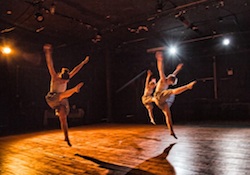
Roschman Dance, seen here in performance, will be joined by fellow NYC company DoubleTake Dance in the shared-bill performance, “ARRIVAL.” Photo by Silvia Saponaro.
The directors of both of these companies usually pay their dancers out of their own pocket. Roschman, for example, is often employed with commercial choreographic work for music videos, concerts, musicals, industrials and resort shows, which allow him the funds to pay for his company’s season. It comes with sacrifices, however. Rather than buy the latest iPhone or have a lavish night out, Roschman says he’d rather spend his income on rehearsal hours.
“Needless to say, I still have a flip phone from 2009,” he adds. “It’s hard to justify spending money on anything other than the company right now. There is a certain pride I have about doing it without a wealthy benefactor. I built this company on my own.”
The directors of DoubleTake agree. While they have received some commissions and support from the community, company costs are often paid for out-of-pocket. “Having a company means a lot of personal sacrifice that, in our case, certainly pays off,” Martinez de Baños says. “If you are not willing to do that, you shouldn’t have a company.”
Both companies hope that over time, with more exposure and outside funding, they can pay their dancers more.
“When I started out, the pay for my dancers was ridiculously low, but I paid them at least something,” Roschman explains. “It was a symbolic gesture at the time. Now, my dancers are paid hourly for rehearsal and then per performance. It’s not enough for the amazing work they do. A 10-year plan would have them on yearly salaries and health benefits. I think once I can get that I will have a good night’s sleep for the first time in a long time.”
Rehearsing in Safe Spaces
It can be easy to save money on cheap rehearsal space, but oftentimes those studios are slippery, not sprung, run-down or tiny. DoubleTake and Roschman Dance are always sure to rehearse in dancer-friendly spaces.
“Our body is our tool, and we have to protect it,” Carter says. “We wouldn’t like to rehearse or perform in inappropriate venues; therefore, we are not going to ask our dancers to do so.”
Boycotting the Trend of Paying to Perform
Many festivals and showcases offer opportunities for lots of companies to show their work, but often those come with an application and/or participation fee. DoubleTake and Roschman Dance strongly believe that no professional company should ever be charged for their performance.
“It seems like these days, almost every festival application comes with a fee that ranges from $25-100, and some companies have the audacity to charge dancers to audition,” Roschman says. “It’s nothing more than an attempt to take money from a section of the population that really truly needs all the money they can save. Yes, it takes money to rent space for an audition, but if you can’t afford to rent space for an audition, maybe that’s a sign you shouldn’t be running a dance company. Yes, it takes time and money to curate and host a festival, but if you can’t pay for one, maybe you aren’t ready to host one.”
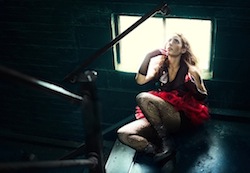
Ashley Carter, co-artistic director of DoubleTake Dance. Photo by Giorgio del Vecchio, Noir Tribe Media.
Being the Choreographer
Carter and Martinez de Baños believe that choreographers should not rely on or expect the dancers to create the piece.
“Always come prepared to rehearsal,” Martinez de Baños adds. “The choreographer choreographs the piece. Improvisation is a great tool but should not be the means in which to create the product the choreographer then puts his or her name to.”
Likewise, Roschman aims to present himself as a leader. “This often means hiding your fear, stress and panic,” he says. “There is much to stress about, but dancers need a clear vision and calm voice. They need to feel that a director is 100 percent behind his or her own creation. I’m not always perfect at this, but I’m always trying for it.”
Being Kind to Others in the Industry
At the end of the day, dancers and choreographers have the same goal: to express themselves, present a unique vision and to keep art alive. That said, directors such as Roschman believe in treating others in the dance community with mutual understanding and respect.
“Be as kind as possible to dancers,” he says. “They need to be pushed for sure, but they shouldn’t be berated or embarrassed. Every day, I try to figure out a little more about the balance between pushing someone and nurturing someone. Be kind to other choreographers. We’re all in this big city together, trying to do the same thing. Always treat venue tech staff as if they are royalty. They can make or break your performance.”
Carter, Martinez de Baños and Roschman are looking forward to working together for the first time this June, as the shared-bill performances will symbolize a meeting of the minds.
“Not only do they share our ideals, but they are an incredible team to work with,” Carter says of Roschman Dance. “Unlike many we’ve worked with in the past, they are professional, organized, generous and humane. We are enjoying the process and are looking forward to sharing the stage.”
“I feel so lucky to have met DoubleTake’s amazing directors,” Roschman says. “They are such strong, capable, creative, smart women. We both believe in strong technique and strong statements. It’s so refreshing to work with directors who understand what it means to be a working professional and who care as much as I do about raising the bar for our industry.”
For tickets and more information on ARRIVAL, visit www.theatre80.net or www.roschmandance.com.
Photo (top): Vanessa Martinez de Baños, co-artistic director of DoubleTake Dance. Photo by Giorgio del Vecchio, Noir Tribe Media.


